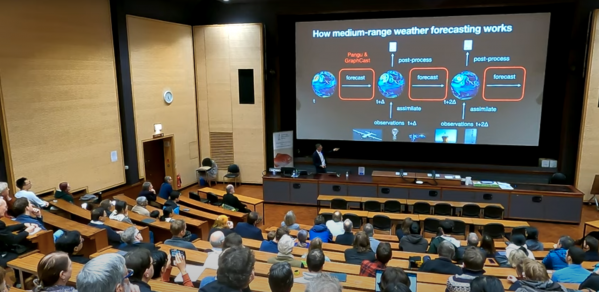
Richard Turner, Professor of Computer Vision and Machine Learning, recently gave a talk for the Cambridge Philosophical Society discussing the quiet AI revolution that has begun in the field of numerical weather prediction.
The deep learning based forecasts have also been shown to be surprisingly robust, performing reasonably even when faced with rare or extreme events. Consequently, weather prediction centres like the World Meteorological Organisation and the European Centre for Medium-Range Weather Forecasts are now racing to build machine learning teams and publicly testing AI forecasts.
Over the last 18 months a quiet AI revolution has begun in the field of numerical weather prediction. Medium-term weather prediction involves forecasting several days to a couple of weeks in the future and these forecasts are critical for making many social and economic decisions.
The standard approach to this problem is to run detailed global simulations of the earth's atmosphere using a supercomputer, so-called numerical weather prediction (NWP). As little as one year ago, researchers in this field had thought it unlikely that machine learning approaches would be competitive with numerical weather prediction any time soon.
However, over the last year, the same advances that underpin large AI language models, like ChatGPT, have been applied to weather prediction. Surprisingly, these models achieve a performance which is already competitive with standard NWP, but with a computational cost that is thousands of times cheaper.
The deep learning based forecasts have also been shown to be surprisingly robust, performing reasonably even when faced with rare or extreme events. Consequently, weather prediction centres like the World Meteorological Organisation and the European Centre for Medium-Range Weather Forecasts (ECMWF) are now racing to build machine learning teams and publicly testing AI forecasts.
Professor Turner's talk below describes this quieter AI revolution, giving an introduction to medium range weather forecasting and a brief history. The talk then describes how machine learning methods can be applied to this task and gives a quick introduction to transformers - the new machine learning technology that underpins large language models like those used in ChatGPT and which can also be applied to forecasting. The talk ends by showing AI forecasts and comparing them to the conventional approach.
The machine learning methods in the talk accelerate the forecasting step of weather prediction. However, weather predictions involve a second step called data assimilation in which observations of weather from satellites, weather stations, ships, baloons and aircraft, are incorporated. This takes roughly half of the computational effort in forecasting, but has not been touched by AI methods. Professor Turner's group is working on an even more ambitious approach which will use AI to accelerate and improve both the forecasting and assimilation steps of weather prediction, producing a fully end-to-end trained system.
Richard Turner is Professor of Computer Vision and Machine Learning in the Department of Engineering at the University of Cambridge and a Visiting Researcher at Microsoft Research Cambridge. He was Co-Director of the UKRI Centre for Doctoral Training in the Application of Artificial Intelligence to the study of Environmental Risks (AI4ER CDT).
His work has been presented in oral presentations at top machine learning conferences including AAAI, AIStats, ICLR, ICML and NeurIPS and he has given keynote lectures and tutorials at the Machine Learning and Signal Processing Summer School, the International Conference on Machine Learning, Optimization & Data Science, and the Machine Learning Summer School.
He has been the lead supervisor for 20 PhD students (13 now graduated) and 10 Postdoctoral Research Associates. He has received over £10M of industrial funding from Microsoft, Toyota, Google, DeepMind, Amazon, and Improbable and over £15M of funding from the EPSRC. He has been awarded the Cambridge Students' Union Teaching Award for Lecturing. His work has featured on BBC Radio 5 Live’s The Naked Scientist, BBC World Service’s Click and in Wired Magazine.

